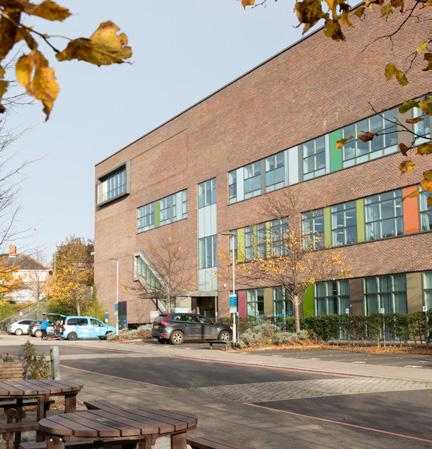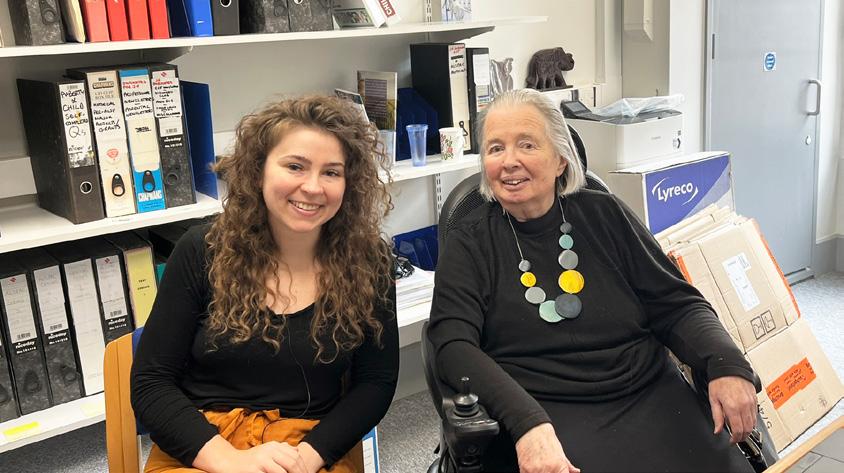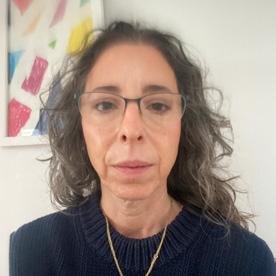

Looking to the future

Good news! We’re delighted to share that we’ve received £5.2 million of new funding, including support from Wellcome, the Medical Research Council and the University of Bristol. This will support the study for the next five years.
With this, we will help researchers around the world to explore big questions, like whether pre-eclampsia affects future heart health for mums and their children (see page 10).
But of course, we couldn’t do this without you! Our participants are the backbone of the study and it’s thanks to your involvement that our data remains timely and relevant for scientists around the world.
“Children of the 90s is a real treasure trove of information and unique for the depth of its health data. Thanks to the new funding, researchers can continue to collect data from participants to improve the health and wellbeing of current and future generations.”

Professor Evelyn Welch, Vice-Chancellor and President of the University of Bristol
RIGHT: THE LEARNING & RESEARCH
We’ve moved!
We have moved into our new home at the University’s Learning & Research Building at Southmead Hospital where you may visit us for future clinics and sub studies (others will continue at other research centres).

Scan the QR code for travel information and a map to our new clinic, or visit our website here.
Are you expecting a baby?
Many of you have now started a family of your own and as a result, over 2,400 Children of the Children of the 90s (COCO90s) are enrolled and taking part in our baby and toddler clinics.
More are born every week, including at Southmead’s Central Delivery Suite.
With our new Southmead Hospital home, we hope to work even more closely with NHS staff, research midwives and clinical researchers, planning research and gathering data and samples such as placentas as the next generation of COCO90s babies arrives!
We will also continue working with other maternity suites including Weston General Hospital, Royal United Hospital Bath and St Michael's Hospital Bristol.

“Henry enjoyed
his first COCO90s visit last week
&
loves his bear, thank you.”
Amy


Scan the QR code to find out more about COCO90s and how you can enrol your family! Or visit our website here.

Our research
ABOVE: PROFESSOR AGBAJE
Your data continues to be used by researchers around the world to help answer important questions about health and well-being. Here is a snapshot of some of the research published this year.
Challenging how we measure obesity
For nearly a generation, weight-toheight ratio charts and body mass index (BMI) for age and sex have been used to diagnose children with obesity. However, these assessment tools are inaccurate in childhood and adolescence since they do not distinguish fat mass from muscle mass.
Now, Professor Andrew Agbaje from the University of Eastern Finland is challenging this old method of using BMI and proposes we move to a new, easier measure which may be a better assessment of body composition.
This is the first study of its kind to compare findings from over 7,237 of your DXA scans taken at ages 9, 11, 15, 17, and 24 with corresponding BMI and waist circumference-to-height ratio measurements.
Researchers found that the waistto-height ratio closely matched DXA scans in detecting excess fat, making waist-to-height ratio a promising, cost-effective tool for monitoring and preventing obesity. This could greatly enhance how we track and address childhood obesity.
Professor Agbaje explains: “Waist circumference-to-height ratio might be preferable to BMI assessment in child and adolescent clinics as an inexpensive tool for detecting excess fat. Parents can easily confirm whether the BMI and weight of their children is due to an increase in excess fat by examining their child’s waist circumference-to-height ratio."
@30 in numbers
Our @30 clinic was the biggest data collection yet and we’d like to thank each and every one of you who took part. Over 13,000 participants from across three generations participated. Plus we did home and virtual visits too. Here is a snapshot of the clinic since it started in 2021.
8,555
Full body scans using our DXA machines

9,000
Blood, saliva and urine samples
3,307 Lung function tests
2,006
CPETs - this assesses the cardiopulmonary system at rest and during exercise using our special ‘exercise bike’

3,694 Liver scans
100 Virtual clinic visits involving participants from Australia, New Zealand, Canada, Egypt and Europe!
We The Curious SHOPPING TROLLEY SECRETS
Pop down to We The Curious this winter to explore what researchers could learn about health from shopping data. The team would like to find out how you feel about sharing your data in this way. This new interactive exhibition is led by Dr Anya Skatova, Senior Research Fellow at the Bristol Medical School, and is included in your ticket price! Anya began her work in this area by collecting shopping data from loyalty cards from Children of the 90s participants who signed up to take part.

Our research
Breaking the cycle of loneliness and abuse
New research has revealed that childhood trauma (such as bullying or domestic abuse) leads to feelings of loneliness. This then increases the risk of people entering abusive relationships and becoming even more isolated – trapping them in a ‘loneliness loop’.
Researchers analysed detailed interviews with young people aged 18-25 alongside data from 3,000 of your questionnaires. The team are now calling for clearer information on identifying abusive relationships from a younger age in schools and better access and signposting to specialist services.
The research sheds light on how these patterns form and suggests ways to help young people escape the cycle of abuse.
“Professionals supporting young people need training to recognise controlling behaviours and to provide trauma-informed care.”
Dr Maria Barnes, Research Fellow at the Centre for Academic Primary Care, University of Bristol
Click here for a list of support organisations, or visit bit.ly/support-orgs
How does daily activity impact health?

Researchers are running a study looking at daily activity patterns to understand how they affect cardiovascular health.
If you are invited to take part, you’ll wear a simple wrist monitor (Axivity device) for 7 days. This device tracks your movement around the clock without tracking your location or biological changes.
By linking with your data, we hope to uncover crucial insights into the benefits of physical activity at different life stages.
By participating, you will contribute to important research that could help shape future health recommendations.
This is open to our original study children who completed the bike test as part of @30. We are inviting eligible participants over email with details about how to get involved.
Meet the participants

“It was fantastic to meet Jean after all these years of being involved. She is a big part of why I have continued to take part.”
Faith came along for her @30 visit in June and fulfilled a lifelong dream to meet Professor Jean Golding! We sat down with Faith to talk about her experience of being in the study.
Q: What are your earliest memories of the study?
I remember my mum and dad loving the study (being doctors). My mum would pack the questionnaires to take on holiday to my granny’s house in Surrey. She would lay them out with the correctly coloured pen and I would sit at her dining room table to fill them in to send back. I loved it!
Q: Why do you continue to be part of the study?
I am really, really passionate about the study and its world class significance. My family are all medical and we are very into medical and healthcare research. Fascinating stuff. I love being part of the study, it’s a privilege! I’m a Hospital Manager and have a special interest in diabetes and endocrinology from my parents growing up who worked in the medical field – so it all just ties in so beautifully with the study. So many amazing things have come out of this lifelong work.
Q: What words of encouragement would you give to anyone considering taking part in the study?
I would say ‘do it!’ It is fascinating –through the @30 clinic I got to see into my own body. And continuing the questionnaires will help shape the future of the study.
Meet three generations of participants!
Melanie was approached to take part in the study when pregnant with her daughter Melissa in St Michael’s Hospital. Now Melissa’s children Jack and Teddy are part of the study too!
“My earliest memories are a fun-filled day off school where we would be well looked after, fed and go home with lots of treats! My recent visit was amazing - and we got to meet Jean! It was very well organised and child friendly with food and drinks provided. It is a very interesting study and I think elements of my health will be beneficial for studies. It's great my children are involved too.”
Melissa


From Sydney to Bristol for the @30 clinic!
A family made the trip to the @ 30 clinic - all the way from Australia! Oliver travelled to watch his sister in the Olympics and also made the time to come and see us.
“I have been part of the study my whole life - I remember filling out the questionnaires with my mum on the couch when I was younger. I think it is a really important thing to be part of it - if I can help give researchers an insight into diseases and mental health that's awesome!”
Oliver

Meet the team
Introducing Professor Abigail Fraser and her research into pregnancy health
Abigail Fraser is a Professor of Epidemiology and our new Executive Director for Data Collection.
We caught up with her to find out about her new role, and her research using placentas collected from original mums and also now from new parents as part of COCO90s.
Q. Can you tell us a bit about your new role?
I will have oversight of data collection efforts over the next five years. This means working with the team to decide when, how and what we will be asking you in questionnaires and clinic visits to make sure that Children of the 90s data continues to support meaningful, impactful research.
“I am so excited to have joined this amazing team. It’s a real privilege to be involved in such a trailblazing study and I see this as an opportunity to give back to a study that has been so central to my work.”

Q. How else have you been involved with the study?
I have been involved in Children of the 90s since 2008, when we invited the original mothers to the Focus on Mothers clinic. At the time I was finishing my PhD here in Bristol, using data from another cohort of women, the British Women’s Heart and Health Study.
My own research focuses on women’s reproductive health and cardiovascular disease. I had my first child in 2009 and I am sure that becoming a mother has influenced my research interests!
Q. What discoveries have you made?
The blood samples and other measures that were collected in the Focus on Mothers clinic enabled us to investigate the links between common pregnancy complications and measures of cardiovascular health.
We showed that women who had a pregnancy complicated by preeclampsia, pre-term delivery or had a small for gestational age baby had higher blood pressure 20 years after pregnancy, making a really important
contribution to the evidence in this area.
This led me to try to understand more about the link between health in pregnancy and mothers’ health in later life – do pregnancy complications cause later life cardiovascular disease? Or are they both caused by a third factor such as pre-pregnancy health?
I think we are much closer to an answer now than we were ten years ago. And with my new research looking at the original Children of the 90s placentas collected over 30 years ago, I think we can get closer still!

Watch Professor Fraser's BBC interview about her new research (or click here)
Your voice matters

Here at Children of the 90s we have always worked closely with our participants and ensured that they have a voice in our research. Since our participants were 15, we have run a participant advisory panel to keep our research relevant and impactful.
Last year we updated this group and it is now called the ALSPAC Participant and Public Advisory Panel (APPAP). This group is made up of both participants and members of the public.
They meet every 8 weeks and help guide our research by offering advice on proposals and participantfacing documents. By sharing their experiences and insights, they play an essential role in improving the quality and relevance of our work.
“Being part of a team that makes a difference to my children and grandchildren has given me a new purpose in my retirement."
Kate
“Having been a lifelong supporter and participant in Children of the 90s studies, I’m now thrilled to contribute behind the scenes on the APPAP committee.”
Matt

Sharing your health records with us

Next year, we’ll be sending you an email about new plans to link your data to your administrative records. With new data protection laws such as General Data Protection Regulation (GDPR) now in place, we would like you to confirm which of your digital records we can link to.
You do not need to do anything if you are happy for us to access your records. This is called “opt-out consent,” meaning we will link to your data unless you tell us not to. We will contact you with a ‘decision form’ to complete, so if you do not want us to access your official records please respond and let us know your wishes.
Your contributions have been invaluable, helping us build a better future through world-class research. Expanding the records we connect to will enable even more ground-breaking studies, such as investigating the impact of air pollution or climate on health.
“I last took part over 12 years ago – when I was 18 or 19. I chose to get back in touch because it was about being involved in research and it was local in Bristol – making a difference.”
Natasha

Even if you’ve not been in touch for a while, it’s always possible to reconnect and take part. Scan the QR code or visit our website to find out more.

Eat well, live well
New study links children’s diets to adult heart health
Do you remember filling out food diaries as a child? That data has now been used to find out how childhood diets could affect heart health in adulthood.
Dr Genevieve Buckland studied your eating habits at ages 7, 10, and 13, comparing them to the UK’s Eatwell Guide recommendations. Your heart health was then assessed at our clinics when you were 17 and 24.
Dr Buckland found that meeting at least three dietary recommendations as a child led to a lower risk of heart disease as adults, shown in improved blood pressure, cholesterol levels and body composition.
However many of you were unable to meet these guidelines as children. Only 10-15% ate enough fruit and vegetables, less than 20% got enough fibre and less than 10% ate enough
oily fish. Nearly everyone consumed too much sugar and the majority ate more salt and saturated fat than recommended.
These results have been presented to politicians to demonstrate that we urgently need to find ways to improve children’s diets in the UK.
Researchers suggest that we improve and regulate school meals, and focus on improving diet quality, especially in lower-income areas. They also believe we need greater collaboration with the food industry to reduce unhealthy ingredients and improved health policies, such as extending the soft drinks industry levy to other high-sugar products.
Your participation could help shape future nutrition policies and improve public health for generations to come.
Teen weight stigma impacts self-esteem
Feeling pressured to lose weight as a teen, whether from family or the media, can have lasting effects on how people see themselves, even decades later.
A study of over 4,000 participants aged 31 found that those who faced this pressure, along with people who had been bullied as teens or adults, were more likely to have "internalised" weight stigma. Females, sexual minorities, and those from disadvantaged backgrounds at the same BMI were also at greater risk.

This type of stigma, where people judge themselves negatively based on their weight, is linked to poor mental health and other health issues. This is the first time a study has used a large UK sample to examine who is most at risk of internalised weight stigma.
“We have an opportunity to reduce weight stigma and its consequences by changing how we discuss weight in the media, in public spaces and in families, and how we respond to bullying in schools, workplaces and other settings.
“This is crucial considering how common pressure to lose weight and weightrelated bullying, stigma and discrimination are in many cultures around the world.”
Dr Amanda Hughes, Research Fellow at Bristol Medical School
Hello there!
We are so excited to be in our new home at Southmead Hospital, looking ahead to our future research plans! In this newsletter we bring you the great news that Children of the 90s has been funded for another 5 years. This recognises the real power of what I call ‘team science’ - our team working with academics but most importantly, with you – our dedicated, generous participants!
Our research continues to lead the way, enabling a greater understanding of factors important to our health, disease and wellbeing. The next 5 years are about the latest chapter in your varied and individual lives. Major life events, families and the impact of new children on health all lie within. We are so excited to work with you – our Children of the 90s champions – through this amazing fourth decade.
So, in the same year that we gathered to celebrate our founder Professor Jean Golding's 85th birthday, we are also stepping out again as a community collaboration. Your ongoing support
Get back in touch
To get back in touch simply send your full name and date of birth to:
✉ info@childrenofthe90s.ac.uk Phone 07772 909090

enables transformational research, and a world where deeper understanding and prevention have the chance to influence the future for the next generation.
I find it amazing to think that you started this journey as unborn babies and parents over 30 years ago and after decades of incredible research, the best may be still to come.

Professor Nic Timpson Principal Investigator, Children of the 90s
Perhaps you have a friend or family member who used to be part of the study – be sure to share this with them too! If you’ve not done anything for a while, you could get £20 to say thanks. SQUARE-FACEBOOK Children of The 90s
